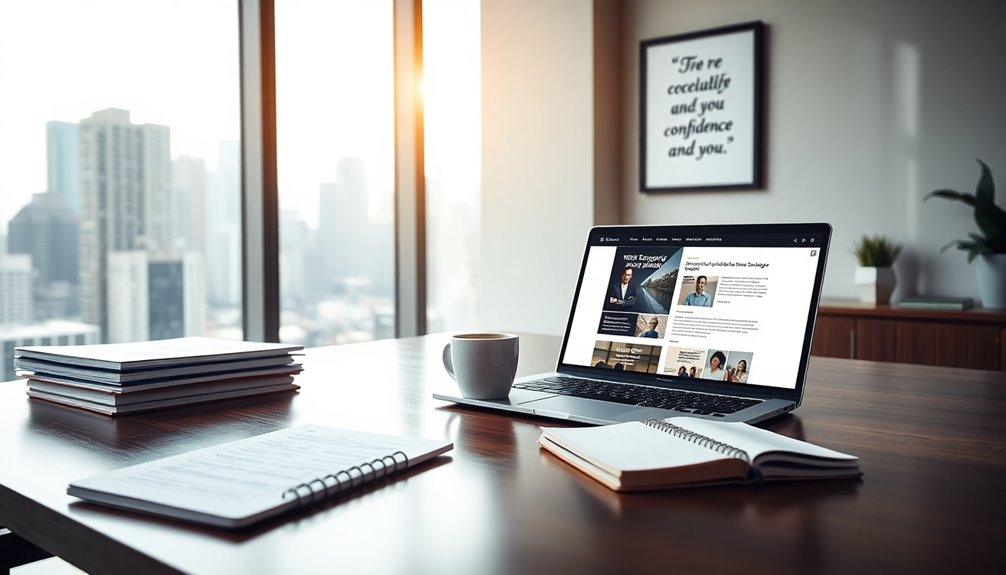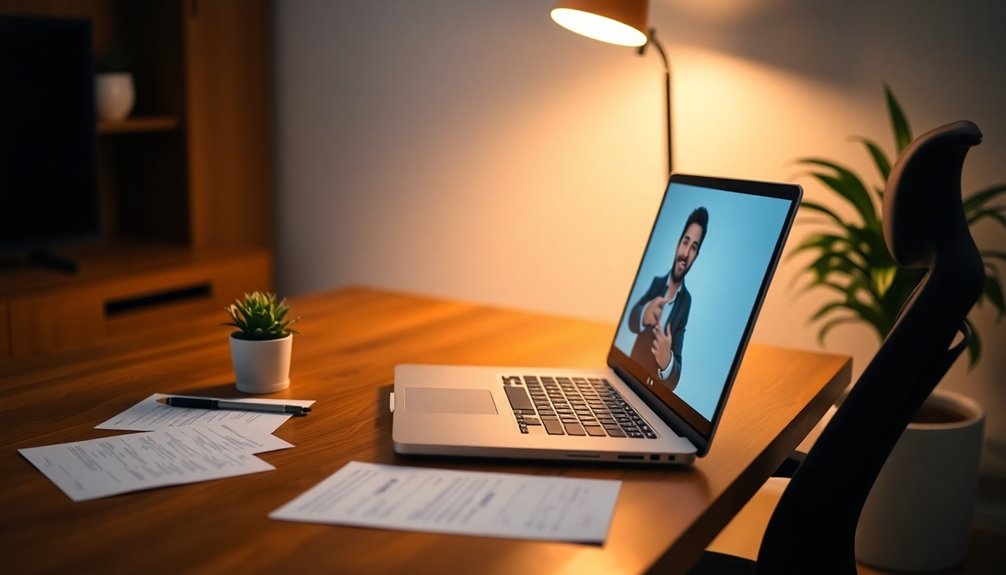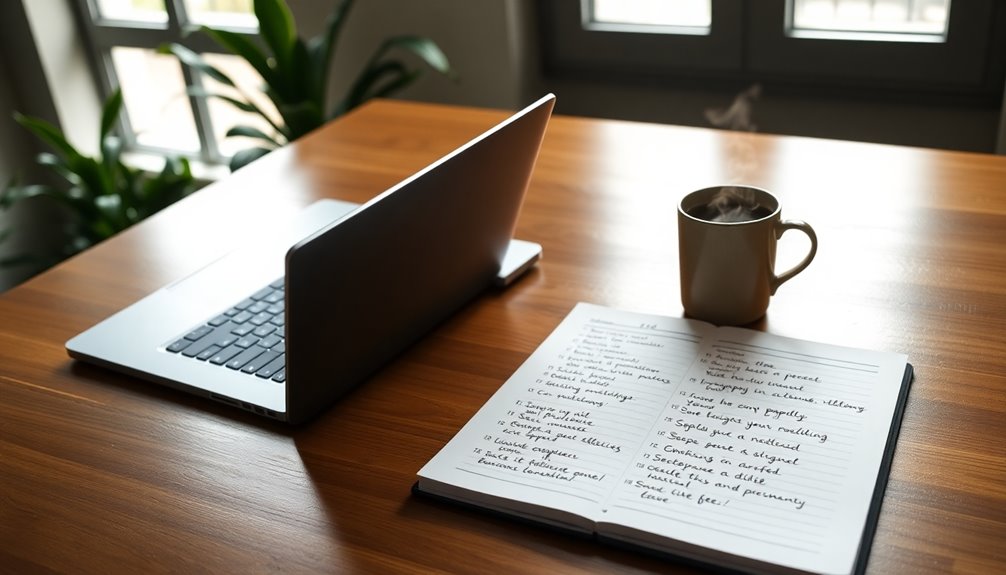To master your interview and ace your responses, start by embracing the "Five Ps": prior preparation prevents poor performance. Review the job description and align your answers with key role points. Research the company's mission, values, and culture to tailor your responses. Practice is essential—record your sessions to spot improvement areas and use storytelling to highlight relevant experiences. Make sure your technical setup is solid, especially for virtual interviews, with clear audio and a professional background. By focusing on these elements, you'll feel more confident, and there's plenty more to help you excel ahead.
Key Takeaways
- Prepare thoroughly by reviewing the job description and aligning your experiences with key responsibilities.
- Research the company's mission and values to tailor your answers and demonstrate cultural fit.
- Practice your responses using storytelling techniques to clearly articulate your experiences.
- Conduct mock interviews and record sessions to identify areas for improvement and boost confidence.
- Ensure a professional technical setup for virtual interviews, including a clear background and working audio/video.
Interview Preparation Techniques

When it comes to nailing your interview, preparation can't be overlooked. You need to embrace the "Five Ps": Prior Preparation Prevents Poor Performance. By preparing thoroughly, you reduce unwelcome surprises and boost your confidence.
Start by reviewing the job description and planning your answers, focusing on key points that align with the role. Arriving on time is essential, so plan your route for in-person interviews or log in early for virtual ones to troubleshoot technology issues.
Organizing a folder with your resume and writing materials can save you stress. Additionally, consider using Post-It notes around your screen during virtual interviews to keep important points visible. This approach guarantees you maximize your interview time effectively.
Researching the Company

Researching the company is essential to your interview success, as it equips you with insights that can set you apart from other candidates. Start by exploring the company's website for mission statements, values, and culture. Utilize platforms like Indeed to read employee reviews and understand community involvement.
Here's a quick overview of what to focus on:
| Aspect | Tips |
|---|---|
| Mission & Values | Align your responses with their goals |
| Company Culture | Identify traits that fit their environment |
| Employee Experience | Highlight relevant personal experiences |
Understanding the Job Description

Understanding the job description is a key step in preparing for your interview. It helps you identify the skills and experiences the employer values most.
Start by breaking down the job title, responsibilities, and qualifications listed. Pay close attention to any specific certifications or training required, as these can be essential for your candidacy.
Reflect on how your background aligns with these expectations and think about examples that demonstrate your relevant experience.
Additionally, grasping the company's culture and values will allow you to tailor your responses effectively. This knowledge not only boosts your confidence but also shows your genuine interest in the position.
Being well-versed in the job description sets the foundation for a successful interview.
Practicing Interview Responses

Practicing interview responses is essential for presenting yourself confidently and effectively. Start by recording your practice sessions to review your performance and identify areas for improvement.
Keep your resume handy for reference, but don't memorize your answers; focus on key talking points that allow for genuine, conversational responses. Storytelling can enhance your engagement, so articulate your experiences clearly while maintaining a positive tone, even in challenging situations.
Active listening is vital, as it helps you respond more relevantly to the interviewer's questions. Make it a habit to practice regularly, as this will boost your readiness for unexpected opportunities and create a more comfortable dialogue during the actual interview.
Consistency is key to mastering your responses.
Answering Common Questions

When you prepare for common interview questions, you'll set the stage for a confident and impactful performance. Focus on standard questions like "Tell me about yourself" and "What are your strengths and weaknesses." Tailor your answers to the job description, ensuring relevance.
Use the STAR method for behavioral questions: describe the Situation, Task, Action, and Result to showcase your experiences effectively. This structured approach helps convey your thought process and accomplishments.
Additionally, don't hesitate to ask about the company's culture or challenges the team faces; this shows your engagement. Practicing these responses will help you articulate your thoughts clearly, making you more memorable and helping you connect with your interviewer.
Technical Setup for Interviews

Successful interviews hinge on effective technical setups, which can greatly enhance your performance. For virtual interviews, verify your web camera and audio are clear, and check your internet connection beforehand.
Familiarize yourself with the video conferencing platform to avoid last-minute glitches. Create a well-lit, clutter-free background that presents a professional image. Communicate with household members to minimize interruptions during the interview.
Dress appropriately, keeping the company culture in mind, and manage any distractions in your environment. Test your technology a day before to troubleshoot potential issues, and have a backup plan ready, like a phone interview option.
Taking these steps helps you focus on showcasing your skills and personality, rather than worrying about technical difficulties.
Managing Interview Environment

Creating an ideal interview environment can greatly impact your performance and confidence during the process.
For virtual interviews, choose a quiet, well-lit space with a clutter-free background. Inform household members about your interview time to minimize interruptions. Test your technology beforehand; verify your webcam and microphone work properly and your internet connection is stable. Dress appropriately for the company culture to project professionalism.
If you're interviewing in person, arrive early to account for any delays, and scout the location beforehand. Bring organized materials like your resume and questions in a folder.
A well-managed environment allows you to focus on showcasing your skills and engaging with your interviewer confidently.
Frequently Asked Questions
How Do I Handle Difficult Interview Questions?
When you face difficult interview questions, stay calm and take a moment to gather your thoughts.
Use the STAR method to structure your answer, focusing on the situation, task, action, and result.
Be honest about any challenges while emphasizing what you learned.
It's okay to ask for clarification if needed.
What Should I Do if I Don't Understand a Question?
If you don't understand a question during an interview, don't hesitate to ask for clarification. You can say something like, "Could you please rephrase that?" This shows that you're engaged and committed to providing a thoughtful response.
Take a moment to gather your thoughts before answering. It's better to pause and respond accurately than to rush and miss the mark.
How Can I Follow up After the Interview?
After your interview, don't let the grass grow under your feet!
Send a thank-you email within 24 hours, expressing gratitude for the opportunity and reiterating your interest in the role. Mention something specific from the conversation to personalize it.
If you haven't heard back after a week or two, feel free to follow up with a polite inquiry about your application status.
Staying engaged shows your enthusiasm and professionalism.
What Should I Bring to an In-Person Interview?
For an in-person interview, you should bring several essential items.
Start with multiple copies of your resume, as well as a list of references. Include a notepad and pen for taking notes.
If you have a portfolio or work samples, bring those too. Organize everything in a professional folder.
Don't forget to prepare a few thoughtful questions to ask the interviewer, showing your interest in the role and company.
How Do I Deal With Nerves During an Interview?
Did you know that about 70% of people experience anxiety before interviews?
To deal with nerves, focus on your preparation. Practice your responses and visualize success. Take deep breaths to calm your mind before entering the interview.
Remember, it's a conversation, not an interrogation. Arriving early helps you settle in and gather your thoughts.
Finally, remind yourself of your qualifications; confidence can turn nerves into excitement and energy during the discussion.
Conclusion
As you step into your interview, remember that preparation transforms anxiety into confidence. Picture yourself as a skilled performer, seamlessly shifting from one question to the next, while your interviewer enthusiastically hangs on your words. By mastering your responses and understanding the company's vision, you turn a potential stumbling block into a solid foundation for success. Embrace the challenge, and let your preparation shine through—after all, every interview is not just a chance to impress but an opportunity to connect.









